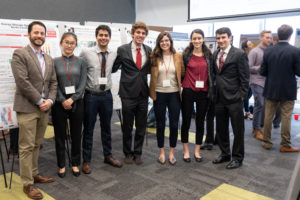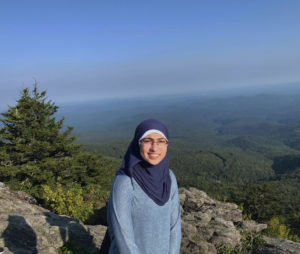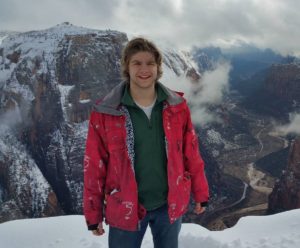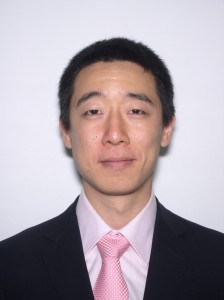Dr. Jeremiah Johnson
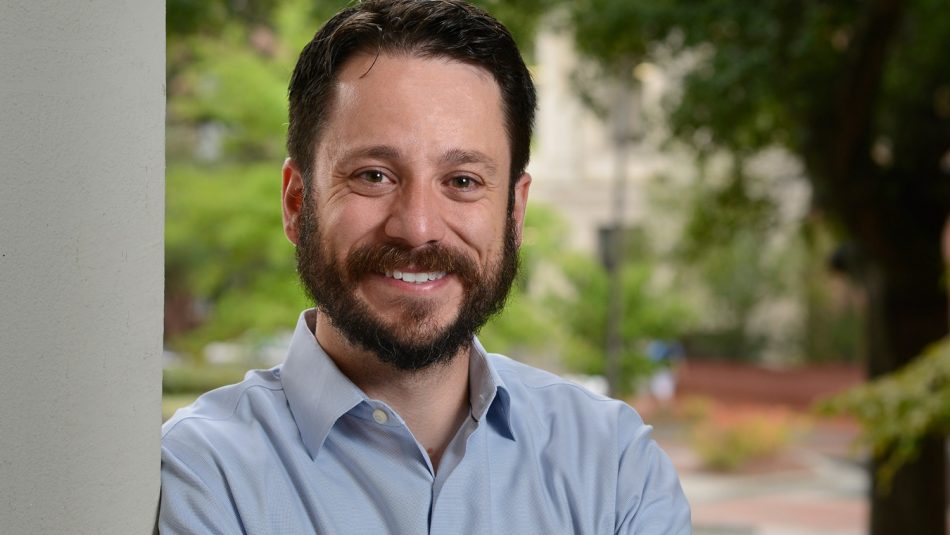
Dr. Jeremiah Johnson is an Associate Professor at North Carolina State University’s Civil, Construction and Environmental Engineering department. He joined NCSU in 2017, as a part of the Chancellor’s Faculty Excellence Program cluster hire in Sustainable Energy Systems and Policy. Dr. Johnson conducts research on sustainable energy and materials systems, with a cross-cutting aim of improving life cycle assessment methods.
Dr. Johnson earned a B.S. in Chemical Engineering from Clarkson University in 2001 and a PhD in Environmental Engineering from Yale University in 2007. Upon completion of his graduate studies, he spent several years working in the energy industry, advising utility executives on renewable energy strategy.
Ph.D. Students
Jethro Ssengonzi
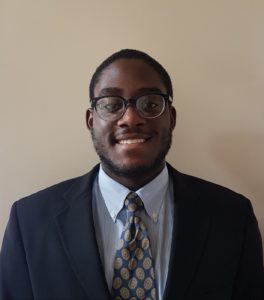 Jethro Ssengonzi is a PhD student in civil engineering with concentration in computing & systems. His research focuses on assessing the reliability of grid operations under increasing levels of variable renewables. Before joining our group, he obtained his B.S. in mechanical engineering at the University of Maryland Baltimore County (UMBC). His passion for improving civil infrastructure systems has inspired his focus on open energy access and sustainable energy. Jethro has interests in sports and music.
Jethro Ssengonzi is a PhD student in civil engineering with concentration in computing & systems. His research focuses on assessing the reliability of grid operations under increasing levels of variable renewables. Before joining our group, he obtained his B.S. in mechanical engineering at the University of Maryland Baltimore County (UMBC). His passion for improving civil infrastructure systems has inspired his focus on open energy access and sustainable energy. Jethro has interests in sports and music.
Lily Xinyi Liu
 Lily is a PhD student in Environmental Engineering. Her research interest is in energy system modeling and life cycle assessment. Lily recently led a life cycle assessment on sedimentary basin CO2-enabled geothermal power, with collaborators at the University of Michigan and Ohio State University, and with funding from the Sloan Foundation. Ongoing work includes advancing LCA methods to characterize novel plastic recycling approaches. Before joining NC State, she conducted an independent study on life cycle assessment of water usage in bioenergy and carbon capture and storage (BECSS) during her master’s at Carnegie Mellon University. More specifically, the research goal was to measure the feasibility of BECCS regarding water usage and energy consumption. She also loves psychology, swimming, and music.
Lily is a PhD student in Environmental Engineering. Her research interest is in energy system modeling and life cycle assessment. Lily recently led a life cycle assessment on sedimentary basin CO2-enabled geothermal power, with collaborators at the University of Michigan and Ohio State University, and with funding from the Sloan Foundation. Ongoing work includes advancing LCA methods to characterize novel plastic recycling approaches. Before joining NC State, she conducted an independent study on life cycle assessment of water usage in bioenergy and carbon capture and storage (BECSS) during her master’s at Carnegie Mellon University. More specifically, the research goal was to measure the feasibility of BECCS regarding water usage and energy consumption. She also loves psychology, swimming, and music.
Gavin Mouat
Gavin is currently working toward an M.S. in Environmental Engineering.
Bianca Meotti
Bianca is a PhD student in Environmental Engineering. Her research focuses on power systems and air pollution modeling. Before joining our group, she obtained her M.S. in Environmental Engineering and B.S. in Sanitary and Environmental Engineering at Federal University of Santa Catarina, Brazil. Bianca has interests in outdoor activities, sports, traveling, and reading. She is co-advised with Prof. Fernando Garcia Menendez.
Alumni
Aditya Sinha
Aditya Sinha currently serves as a Research Scholar within NC State’s Department of Civil, Construction, and Environmental Engineering. His research focuses on utilizin g macro-scale energy systems models to assess necessary technological and policy-driven measures for achieving a sustainable future. Currently, he is involved in developing open-source tools that address questions pertaining to the evolution of the United State energy system. His primary engagement is in the Open Energy Outlook initiative, supported by the Alfred P. Sloan Foundation. This initiative is geared towards scrutinizing potential energy system trajectories for the United States, thereby providing crucial insights to shape energy and climate policies. Aditya Sinha has previously conducted research into understanding the characteristics of emissions from biomass burning alongside the Environmental Protection Agency. His previous work also delves into the atmospheric evolution of these emissions, that lead to the formation of another category of pollutants known as secondary organic aerosols. At NC State, Sinha teaches Energy and Climate (CE478/578) and Energy Systems Modeling (CE796).
g macro-scale energy systems models to assess necessary technological and policy-driven measures for achieving a sustainable future. Currently, he is involved in developing open-source tools that address questions pertaining to the evolution of the United State energy system. His primary engagement is in the Open Energy Outlook initiative, supported by the Alfred P. Sloan Foundation. This initiative is geared towards scrutinizing potential energy system trajectories for the United States, thereby providing crucial insights to shape energy and climate policies. Aditya Sinha has previously conducted research into understanding the characteristics of emissions from biomass burning alongside the Environmental Protection Agency. His previous work also delves into the atmospheric evolution of these emissions, that lead to the formation of another category of pollutants known as secondary organic aerosols. At NC State, Sinha teaches Energy and Climate (CE478/578) and Energy Systems Modeling (CE796).
Tongchuan Wei
Dr. Tongchuan Wei is a research assistant professor in the Department of Civil, Construction, and Environmental Engineering at North Carolina State University. His research interests include measurement and modeling of energy use and air pollutant emissions of on-road and non-road vehicles, transportation related air quality impacts  environmental justice, air quality and associated environmental risk assessment, and engineering cost modeling. He has been actively engaged in various research projects, including the quantification and assessment of air pollutant emissions from North Carolina ferry vessels; assessment of environmental justice and historical transportation impacts in North Carolina; evaluation of techno-economical feasibility of decarbonization energy pathways for U.S. freight rail; and quantification of the burden of disease attributable to ambient air pollution and climate change in the United Arab Emirates. He has published ten journal articles, seven conference papers, and four technical reports. He has a bachelor of engineering in environmental engineering from the University of Jinan, China, a master of engineering in environmental engineering from Illinois Institute of Technology, and Ph.D. in civil engineering from North Carolina State University.
environmental justice, air quality and associated environmental risk assessment, and engineering cost modeling. He has been actively engaged in various research projects, including the quantification and assessment of air pollutant emissions from North Carolina ferry vessels; assessment of environmental justice and historical transportation impacts in North Carolina; evaluation of techno-economical feasibility of decarbonization energy pathways for U.S. freight rail; and quantification of the burden of disease attributable to ambient air pollution and climate change in the United Arab Emirates. He has published ten journal articles, seven conference papers, and four technical reports. He has a bachelor of engineering in environmental engineering from the University of Jinan, China, a master of engineering in environmental engineering from Illinois Institute of Technology, and Ph.D. in civil engineering from North Carolina State University.
Aditya Keskar
 Adi completed his PhD in 2023, focusing on sustainable energy systems, and is now an engineer with North Carolina Utilities Commission and a lecturer at UNC-Chapel Hill. While at NC State, his research included large-scale experimentation with building air conditioning systems to better understand their ability to provide grid-balancing services. This work was funded by the Department of Energy and conducted in collaboration with researchers at University of Michigan and Stanford. Published work on grid-interactive buildings includes an extensive dataset, a perspective piece on the role of building experimentation, and several research papers. In separate study, with collaborators from NIT-Raipur, Adi examined the operation and environmental impact of off-grid solar water pumps in India, with the findings published in a special issue of Environmental Science & Technology.
Adi completed his PhD in 2023, focusing on sustainable energy systems, and is now an engineer with North Carolina Utilities Commission and a lecturer at UNC-Chapel Hill. While at NC State, his research included large-scale experimentation with building air conditioning systems to better understand their ability to provide grid-balancing services. This work was funded by the Department of Energy and conducted in collaboration with researchers at University of Michigan and Stanford. Published work on grid-interactive buildings includes an extensive dataset, a perspective piece on the role of building experimentation, and several research papers. In separate study, with collaborators from NIT-Raipur, Adi examined the operation and environmental impact of off-grid solar water pumps in India, with the findings published in a special issue of Environmental Science & Technology.
He enjoys traveling to anywhere near an ocean, cooking, and playing badminton. He decided to pursue a PhD after completing his MS in Electrical and Computer Engineering at the University of Michigan, where he was a part of the Michigan Power and Energy Laboratory (MPEL). He is originally from Bangalore (India), where he received his Bachelor’s in Electrical and Electronics Engineering from PES University.
Qian Luo
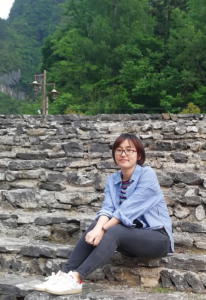 Qian completed her PhD in environmental engineering in 2023 and is currently a postdoctoral researcher at Princeton. While at NC State, Qian explored the potential to reduce adverse human health outcomes by altering power system operations, coupling air pollution models with power system models, supported by NSF funding. She demonstrated that power system operational changes can reduce the majority of adverse health impacts through decreases in coal generation and strategic shifts in the location and timing of pollutant releases. Further study showed that power system decarbonization would yield broad health benefits, but fail to alleviate racial and socioeconomic air pollution exposure inequities. Expanding this work to China, Qian demonstrated the health and climate benefits of economic dispatch and decarbonization of the power sector.
Qian completed her PhD in environmental engineering in 2023 and is currently a postdoctoral researcher at Princeton. While at NC State, Qian explored the potential to reduce adverse human health outcomes by altering power system operations, coupling air pollution models with power system models, supported by NSF funding. She demonstrated that power system operational changes can reduce the majority of adverse health impacts through decreases in coal generation and strategic shifts in the location and timing of pollutant releases. Further study showed that power system decarbonization would yield broad health benefits, but fail to alleviate racial and socioeconomic air pollution exposure inequities. Expanding this work to China, Qian demonstrated the health and climate benefits of economic dispatch and decarbonization of the power sector.
Before joining our group, she obtained her M.S. in environmental engineering at Georgia Tech and B.S. in Ecology at Xiamen University, China. Her passion for the environment and the climate spurred her focus on renewable energy, energy storage, and air quality. As an EDF Climate Corps fellow, she helped design a green data center for a leading digital company (AAC Technologies), capturing and reusing the waste heat generated by HPC. Qian has wide interests in traveling, baking, calligraphy, and traditional Chinese Painting. Qian was co-advised by Dr. Fernando Garcia Menendez.
Ghaza l Kamyabjou
l Kamyabjou
Ghazal completed her PhD in Design in 2023. Her research used machine learning techniques to disaggregate electricity load using low-resolution smart meter data and household surveys. Her work focused on Central Asia, offering unique perspectives into the future of power system planning in cold-climate developing countries. Ghazal was co-advised by Dr. Soolyeon Cho.
Brenna Copeland
 Brenna earned a B.S. in Environmental Engineering at NC State and is a hydraulic engineer at NCDOT. Her research focused on analyzing the environmental burdens associated with shared electric scooters using a life cycle assessment approach. On campus, Brenna was involved in EcoVillage, Zero Waste Wolves, and is a Summer Start mentor. Brenna also loves hiking, camping, and going to the beach.
Brenna earned a B.S. in Environmental Engineering at NC State and is a hydraulic engineer at NCDOT. Her research focused on analyzing the environmental burdens associated with shared electric scooters using a life cycle assessment approach. On campus, Brenna was involved in EcoVillage, Zero Waste Wolves, and is a Summer Start mentor. Brenna also loves hiking, camping, and going to the beach.
Sarah Nagy
Nicole Ryan
Nicole completed her dual degree doctoral student in Natural Resources and Environment and Mechanical Engineering at the University of Michigan and now works at the Office of Policy, U.S. Department of Energy. Her graduate research included a comparative analysis of and decision support algorithm for estimating emissions from grid electricity consumption, as well as an analysis of the life cycle emissions of using lithium-ion batteries for frequency regulation. Additional efforts include quantifying the impacts of forecast electricity net load shapes on real time generation costs through statistical modeling. After graduate school, Nicole completed the IEEE Congressional Fellowship and AAAS Science and Technology Policy Fellowship.
Danny Sodano
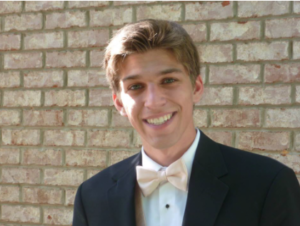 Danny completed his master’s degree in Environmental Engineering with a focus in Energy Systems Analysis and is now a renewable energy engineer at ENGIE North America. His research project included an energy storage study mandated by N.C. House Bill 589 to evaluate the potential costs and benefits to NC utilities and customers of utilizing energy storage throughout the state of North Carolina.
Danny completed his master’s degree in Environmental Engineering with a focus in Energy Systems Analysis and is now a renewable energy engineer at ENGIE North America. His research project included an energy storage study mandated by N.C. House Bill 589 to evaluate the potential costs and benefits to NC utilities and customers of utilizing energy storage throughout the state of North Carolina.
Joe Hollingsworth
Joe completed a Master of Science in Environmental Engineering, with a focus on energy systems analysis, and is now an engineer at TED Renewables. His research focused on solar powered integrated greenhouses, as a part of an interdisciplinary research team involved in NSF’s Innovations at the Nexus of Food, Energy, and Water Systems. Joe assessed the life cycle environmental impacts and an economic analysis of integrating organic photovoltaic technology into greenhouses. Additionally, Joe’s research involves optimization of off-grid greenhouses integrated with solar and battery storage for self-sustaining food systems. His undergraduate degree is from the University of Alabama, where he studied civil and environmental engineering. Joe’s interests are in sustainable energy systems and renewable energy development. In his spare time, he enjoys cooking, playing the banjo, and watching Alabama football.
Sydney Forrester
 Sydney completed Master of Science degrees at University of Michigan focusing on sustainable energy systems and is now working at Lawrence Berkeley National Lab. Sydney received a B.A. in Mathematics and a B.S. in Earth and Environmental Engineering from Columbia University. Following that, she worked for two years in the utility industry focusing on sustainable energy programs that included energy efficiency financing and low-income community solar to improve energy access and affordability. Sydney’s research interests focus on energy justice and sustainable development.
Sydney completed Master of Science degrees at University of Michigan focusing on sustainable energy systems and is now working at Lawrence Berkeley National Lab. Sydney received a B.A. in Mathematics and a B.S. in Earth and Environmental Engineering from Columbia University. Following that, she worked for two years in the utility industry focusing on sustainable energy programs that included energy efficiency financing and low-income community solar to improve energy access and affordability. Sydney’s research interests focus on energy justice and sustainable development.
Danielle Curri
 Danielle completed a B.S. in Civil Engineering, conducting research on industrial symbiosis waste characterization and optimization through computer programming. Through her efforts, she developed a cohesive tool to assist in the creation and development of eco-industrial parks. After graduation, Danielle joined Kimley-Horn and is working toward earning her professional engineering license.
Danielle completed a B.S. in Civil Engineering, conducting research on industrial symbiosis waste characterization and optimization through computer programming. Through her efforts, she developed a cohesive tool to assist in the creation and development of eco-industrial parks. After graduation, Danielle joined Kimley-Horn and is working toward earning her professional engineering license.
Maddie Macmillan
 Maddie completed a B.S. in Environmental Engineering and a minor in Spanish at NC State, and is now pursuing her PhD at Colorado School of Mines. Her research investigates the potential to reduce emissions through the implementation of demand response programs. She is also interested in renewable energy, energy storage and energy policy. She was involved on campus in a variety of ways including being a student ambassador for the Department of Civil, Construction and Environmental Engineering, a Chancellor’s Aide and the Chair of the NC State Sustainability Fund Advisory Board. Outside of the classroom, Maddie is an avid traveler, loves to cook, and enjoys backpacking and camping.
Maddie completed a B.S. in Environmental Engineering and a minor in Spanish at NC State, and is now pursuing her PhD at Colorado School of Mines. Her research investigates the potential to reduce emissions through the implementation of demand response programs. She is also interested in renewable energy, energy storage and energy policy. She was involved on campus in a variety of ways including being a student ambassador for the Department of Civil, Construction and Environmental Engineering, a Chancellor’s Aide and the Chair of the NC State Sustainability Fund Advisory Board. Outside of the classroom, Maddie is an avid traveler, loves to cook, and enjoys backpacking and camping.
Maryam Arbabzadeh
Maryam completed her doctoral studies at the School of Natural Resources & Environment and is currently a post doc at MIT. Her doctoral research informs the development of redox flow batteries using life cycle assessment methods to evaluate environmental and economic performance targets of grid-scale batteries in order to be competitive with the fossil fuel based grid resources that cause climate change. Her other interests include investigating policy mechanisms and incentives that would affect the appropriate utilization of the batteries.
[See Maryam’s interview by Rackham: https://www.rackham.umich.edu/alumni/discover-rackham/student-spotlight-maryam-arbabzadeh]
Dan Ryan
Dan was a dual degree student in the School of Natural Resources and Environment and the Ross School of Business, completing a Master of Science degree in Sustainable Systems and an Masters of Business Administration with a focus on energy. He is now a Strategic Developments Manager at EDF Renewables. His research centered around existing or emerging technologies in the electric grid that can optimize energy throughout its life cycle. Dan was also an active member in the Ross Energy Club, as a director of the Renewable Energy Case Competition and as a team lead of a consulting project. Dan earned a B.S. in Electrical Engineering from the University of Maryland in 2006. Prior to returning to school he worked as an IT consultant for eight years, working on large scale systems integration projects.
Bhuvan Neema
Bhuvan was a dual degree student in Engineering Sustainable Systems program at University of Michigan, completing a Master of Science in Sustainable Systems at School of Natural Resources & Environment and Master of Science in Mechanical Engineering at College of Engineering. He is currently a senior analyst at Nextera Energy. His research work focused on application of battery energy storage (BES) system at grid-scale, as replacement of dirty peaker-power generation units and assessing the environmental impacts as a function of battery systems power rating and storage capacity. Bhuvan has earned Bachelor’s in Mechanical Engineering from Indian Institute of Technology, Roorkee in 2012. He is also experienced as an engineering consultant in building and infrastructure sector and have worked on design of low-carbon energy systems for large scale projects in South-east Asia.
Xinwei Li
Xinwei was a dual degree student in Master of Science in Sustainable System at the school of Natural Resources and Environment (SNRE) and Master of Arts in Applied Economics in the Department of Economics. Her research interests focused on the interaction of carbon mitigation strategies between electricity and transport sectors. She analyzed the impact of cost-effective low-CO2 electricity under EPA’s Clean Power Plan on the adoption of electric vehicles via integrating a comprehensive power system model and a passenger car model. Xinwei is also a research assistant at University of Michigan Energy Institute working on the project of Transportation Energy and Climate Analysis. Before coming to SNRE, she was in the Environmental Management Master Program in Peking University in China researching on Emission Trading System and carbon mitigation pathway in electricity and transportation sectors for the government of Shenzhen, China.
Noah Mitchell-Ward
Noah was an undergraduate student in the EECS department, working towards a B.S.E. in Electrical Engineering. He was a student in the Undergraduate Research Opportunity Program, and is a leader on the BLUElab Woven Wind student project design team. This team designs, builds, and implements small-scale turbines for educational applications in southeast Michigan. After the completion of his degree, Noah began his career at Tesla.
Dr. Yashen Lin
Dr. Yashen Lin was a Post-doctoral research fellow at the University of Michigan, who is now employed at the National Renewable Energy Lab in Golden, Colorado. He earned his Ph.D. in Mechanical Engineering from University of Florida in 2014. He worked with Dr. Johnson on assessing the environmental impacts of demand response and distributed energy storage in power grids. He also works on optimal power flow problems with the EECS department. His other research interests include dynamical system modeling and control theory.
Shreyas Vangala
Shreyas completed a masters student at the School of Natural Resources and Environment focusing on energy-related carbon mitigation strategies. He is now employed at the New York Power Authority. At SNRE, his research focused on identifying the role of nuclear power in reducing carbon emissions for compliance with Clean Air Act regulations in states with poor onshore wind and solar potential and already relatively high nuclear penetration. In addition, Shreyas also worked with the Environmental Law and Policy Center in Chicago and a team of SNRE students to develop a strategy for the reduction of natural gas consumption in metro-Chicago households. He is a Georgia native and holds a B.S. in Ecology and A.B. in anthropology from the University of Georgia.
Rachel Chalat
Rachel completed a dual degree Master of Applied Economics and Master of Science in Sustainable Systems in May 2015. For her research, she created a stakeholder-driven model to assess carbon mitigation from existing power plants in Michigan. As a Dow Sustainability Fellow, Rachel analyzed the value of roof-top solar in Michigan. She is currently a Business Analyst in DTE’s Corporate Energy Strategy Group.
Josh Novacheck

Josh completed the dual degree Engineering Sustainable Systems program between the School of Natural Resources and Environment (M.S.) and Mechanical Engineering (M.S.E). His thesis used power system models to evaluate cost and environmental impacts of renewable energy integration into the grid for two projects: evaluating increased Renewable Portfolio Standards (RPS) for Michigan and the potential for wind power diversification to decrease ramping requirements for conventional generators. Josh is currently an Electricity System Flexibility Analyst at the National Renewable Energy Lab (NREL).
![]()

